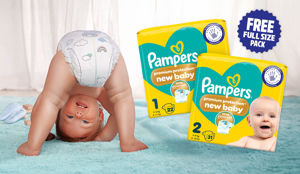Having a baby prematurely is nothing short of terrifying, you are often underprepared, lacking in knowledge, and it can feel incredibly overwhelming. We don’t expect it to look like this, because we aren’t told about it.
The reality for so many parents who go through premature birth (1 in 13 in the UK) is a very different-looking picture to what you normally see represented in the media. One of the main concerns for parents who have a baby born prematurely and need support from a neonatal intensive care unit (NICU) is how can I remain connected to my baby whilst they are in hospital, how can I bond with my baby? We are going to explore that in this blog post.
My name is Dr Frankie Harrison, I am a Clinical Psychologist who supports parents who have been through NICU and I have also been there myself. My son was born at 31 weeks due to preeclampsia in 2019. I know first-hand the devastating impact of prematurity and the difficulties we face in bonding and remaining connected to our children when they are in hospital.
Fight Flight Freeze Fawn
The first and probably most important thing to be aware of is this concept of fight, flight, freeze and fawn. It is a concept that describes different stress responses and coping mechanisms that individuals may employ (automatically and without choice) when faced with a threatening or stressful situation. It is often used to explain the variety of ways people react when dealing with stress, danger, or trauma.
When we are thrown into the world of prematurity and NICU, we often find ourselves in a position where we automatically employ one or more of these coping strategies to be able to survive. It is not a choice. We do not choose to shut down, we do not choose to feel like we want to run away, or like we have no other choice apart from getting angry and fighting.
We may feel uncomfortable asserting our needs and feel like we need to go out of our way to please others and not come across as a burden.
I have said it before, but I am saying it again: it is an automatic response in our nervous system with the aim of protecting ourselves. We can often feel a huge amount of guilt for how we reacted when our baby was born prematurely because it is not what is depicted in the media or what we expected.
The Sudden Rush of Love
I expected to feel a sudden rush of love and connection with my children when they were born because that is what I was told I would feel. That there was nothing else like it.
But what I felt when my children were born, was scared and then numb. I didn’t feel connected. I didn’t really feel a lot, for quite some time. And I know that that was my nervous system giving me a “freeze” response to protect myself, to help me survive.
I didn’t feel that sudden rush, but what I felt was a trickle of love, that built over time, and there were certain things that helped me to get to that point where I felt more connected to my baby when they were in hospital and when we got home.
Here is what has helped me and what has helped so many of the clients that I support through this:
Knowing What the Barriers Are in Connecting With Your Premature Baby
It helps to know what you are up against when it comes to bonding and connecting with your premature baby. We have a rush of stress hormones due to the high level of threat we are under, this reduces our production of our happy, love hormone oxytocin, that we need to build to be able to help us connect with our baby.
We have very physical barriers between us and our child.
Most NICUs encourage parents to visit their babies as often as possible after they are born, but there may be a period of time before you are stable or the baby is stable where you may be in different wards.
When we meet our baby, we may be unable to physically touch them, they may be in an incubator or cot. They may be covered in wires and tubes, making it hard to see them. We may be told that we are not able to hold them for some time. We have a physical distance that makes it difficult for us to be able to connect.
When we are able to see our baby, we can often feel like we don’t know what to do… Can I hold them? Touch them? Feed them? It is important to talk to the nurses on your ward about what is happening and whether you can do these things. They will tell you about ways you can touch, hold, feed and care for your baby. This will likely change as they develop, get older and stronger.
Bonding is not a single event, just because this looks different to how you imagined, just because there are barriers, does not mean that you cannot connect with your child. It just looks different.
What Can You Do To Establish and Build That Connection?
The Use of Physical Touch
If you are able to hold your baby, you can do so through a practice called “Kangaroo care”, which is where you hold your baby, chest to chest, skin to skin. You will most likely need support from the NICU staff to help bring your baby to your chest so that the wires and monitoring systems are still attached to your child.
Kangaroo care is highly recommended by the World Health Organisation (WHO) advises immediate skin-to-skin care for the survival of small and preterm babies, and the health benefits for the child and the parents are significant.
It not only helps with bonding but also has numerous health benefits for preterm infants, such as stabilising their heart rate, improving their breathing, and promoting weight gain. The physical closeness can be incredibly comforting for both parents and the baby.
For some babies, they are too sick to be held straight away, so it is important to know how you can connect physically with your baby if you cannot get them out of the incubator.
There is a method called “containment holding”, where you would put your hands gently on your child's head and feet, to help them feel contained and held. Stroking can sometimes feel overstimulating for babies, especially if they are born very prematurely, and therefore, this type of holding can be beneficial for babies and parents to feel connected and comfortable.
The Use of Smell
Most units will promote the use of smell swatches, these will be two pieces of fabric, one that you can put in your top and one that you can place next to your baby. You will be encouraged to swap these regularly so that you get the scent of your baby and they get the scent of you.
The Use of Sound
Talking, singing and communicating with your baby is incredibly important and powerful, but may be something that you build your confidence in doing. One way of doing this is by reading to your baby.
The unit may have children's books, but you can read anything that feels right for you. Your baby will know your voice from when you carried them; therefore we find that babies respond really positively to this sound.
The Use of Sight
Take pictures and videos of your baby, and document your experience in some way (writing, drawing, logging).
It may not feel like you want to do this at the time, but the majority of parents I talk to wish they had done this more.
If you do not want to do this, just spend time looking at your baby, at their face and their movements, many parents say they spend long periods of time just looking at their babies. It's harder to do through a perspex incubator, but spending time sitting next to the incubator and looking through the holes helps you to get to know them.
Watch how they move and learn how they are communicating.
Caring For Your Baby
The nurses and health care workers talk about things called “Cares”. This is where you look after your baby on the unit, including things such as oral care, feeding, changing nappies, cleaning and monitoring your baby.
As you go through your time on the unit, healthcare professionals will encourage you to do more and more of the caring on your own. This is a learning process and it will take time.
You may be assessed by nurses to make sure that you can do things safely, like feeding your baby through a tube. Participating in cares can feel scary to start with, especially if you feel your baby is very vulnerable, but it can help you to develop that connection and to feel more like a parent.
Spend time getting to know your child's medical conditions, attend ward rounds and know it is OK to advocate for your baby. You are the most important person in your baby's medical team.
It is OK to ask questions and it is OK to challenge if needed.
Feeding Your Baby
This is another one of those things that probably looks quite different from what you imagined. If your baby has been born prematurely, then it is likely that you will be encouraged to express milk for them as there are health benefits of breast milk, especially for premature babies.
Again, there are barriers to being able to produce breast milk, including stress, trauma, physical distance, lack of lactation support, or the Mother having a lack of food, water, rest or medication they need to physically heal after birth.
I say this so we know how hard expressing is, and ultimately, it is important for you to prioritise your mental and physical health so you can be there to support your baby as and when you need to.
If you decide that expressing is right for you and you are able to do so, you will be encouraged to express every three to four hours around the clock and your baby will likely be fed the milk through a feeding tube or bottle (depending on their ability/ gestational age).
Pumping cot side can help to increase your supply. Getting lactation support wherever you can and looking after yourself where possible is essential in trying to make this a successful experience. Accessing support on the ward (if available) may be beneficial.
Gifts
Quite often, if we are underprepared for a premature birth, we may not have the things that we need, we won't have a hospital bag and we won’t have things for our baby, either at the hospital or at home.
Ask others to buy things for you to start with, and when you are able to, spend some time buying things online that may help you feel more connected and personalised to your baby.
Your baby may not need clothes for some time, and most NICU’s have donated clothes you can use to start with, but buying large muslins they can sleep on, a cuddly toy you can put next to or into the incubator, personalising their space or nesting around them can all help you to feel connected.
When the time feels right, you can also start to buy clothes, or things for their space at home. Using Amazon lockers at the hospital can be beneficial.
Looking After Yourself
Think first about your basic needs, these are often unmet for a NICU parent.
Are you able to get some rest as and when you can, are you able to have access to food, water, and outside air?
When our baby is on a different ward to ourselves, or physically in a different place to us, we often do not prioritise our needs, but it is important we do this as and when we can in whatever way we can to be able to build our strength for our children.
It may be that you do not want to leave the cot, so think about how you can look after yourself in this space, bring in healthy food, home comforts, write, talk, create, and rest.
If you are able and willing to have some space from your child, taking a walk or going out for lunch or coffee can be helpful in creating a bit of space and restoration.
Separation At Home
There may come a time when you need to leave your baby in the hospital. This is painful and difficult for parents.
Something that helped me a lot was developing a goodbye-for-now routine, providing a feed cares, reading a story or singing a song, having a cuddle and saying goodbye for now, felt like I was saying goodnight and tucking my baby in for the night until I saw him in the morning. It also helped me to feel more like a Mum.
It is OK to call the unit as much as you like when you are home, some units also use technology so you can see your baby. They may keep a diary or notes, or you can ask them to do this when you are away from them.
Ask the nurses to involve you in as many firsts as possible, for example, ask if they can wait to move them to different rooms, dress them, bathe them or feed them. It is important for you to be involved in as many of those activities as possible.
Imagining Coming Home
We still get that urge to nest, even if our baby has been born prematurely. Therefore, spending some time at home, preparing the baby's space, or getting the things you need can help you to develop some hope and connection with the idea of your child coming home. This may feel too risky or overwhelming for people, so it is important to do what feels right for you.
Support
Know that there is support available and others who have been through this same thing. There is a community of like-minded people out there, who are waiting to connect with you.
I have an online community at @miraclemoonuk and we have a blog post with all of the support available for NICU parents here
If you are struggling to connect with your baby, it is important to seek support from a professional. The trauma and impact on your mental health from having your baby prematurely is important to take into consideration, and know that things can change.
It's important to note that while neonatal care can pose challenges, it doesn't mean that bonding and attachment cannot develop or strengthen over time. Healthcare professionals should recognise the significance of parent-baby bonding and often support and encourage strategies to foster it.
This is your baby, you are their parent and whilst this may look different and it may take time, you can develop an incredibly strong connection and bond with your premature baby.







